“Multimorbidity in non-communicable diseases in South African primary healthcare”
The overarching NIH HIV/AIDS research priorities are: 1) research to reduce the incidence of HIV/AIDS, including the development of safe and effective HIV/AIDS vaccines; 2) development of the next generation of HIV therapies with improved safety and ease of use; 3) research towards a cure for HIV/AIDS; and 4) HIV-associated comorbidities and co-infections. Basic research, health disparities, and training that cross-cut these priorities also will be supported.
On July 20, 2015 – The City of Los Angeles AIDS Coordinator’s Office hosted a one-day event, “Addressing the Intersection of Intimate Partner Violence, Trauma, and HIV,” at the California Endowment. The event was attended by over 180 service providers, including domestic violence counselors, housing specialists, HIV testing and prevention providers, healthcare clinicians, policy-makers, and researchers. The presentations and panel discussions explored the impact of violence and trauma among underserved communities who are at risk for or living with HIV and emphasized the importance of providing trauma-informed care as part of HIV service delivery.
CHIPTS was a proud sponsor and collaborator of this event. Congratulations to the AIDS Coordinator’s Office and all of the community partners that helped organize this successful, well-attended event.
For a copy of the event program, please click here.
Below are slides from the event.
Keynote Presentation:
Breakout session:
- Addressing the Effects of Violence and Abuse to Improve Health Outcomes for Women Living with HIV – Elizabeth (Liz) Brosnan Johnson and Erin Falvey, PhD
- Domestic Violence 101 for HIV Workers – Zara Espinoza, MSW
- Experiences of Partner Violence among Young Men who Have Sex with Men: Implications for HIV and Violence Prevention Programs – Katrina Kubicek
- HIV 101 for Domestic Violence Workers – Grissel Granados, MSW and John Thompson, MSW
- Human Trafficking and HIV Prevention with a Focus on Latina Women – Barbara Kappos, LCSW
- Teen Dating Violence in the LGBTQ Community – Giovanna Martinez and Mieko Failey, Esq.
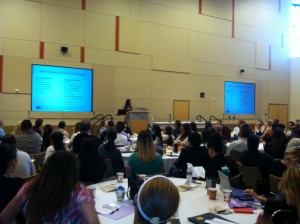
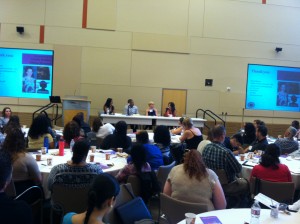
In July 2015, the White House released the National HIV/AIDS Strategy for the United States: Updated to 2020. This Update reflects the work accomplished and the new scientific developments since 2010 and charts a course for collective action across the Federal government and all sectors of society to move us close to the Strategy’s vision.
To read the updated National HIV/AIDS Strategy, please click here.
For more info, visit www.aids.gov.
On June 30, 2015, the Los Angeles County Commission on HIV Transgender Caucus hosted a one-day event entitled, “L.A. Trans* Health Summit: Creating Comprehensive Services for the Trans* Community.” The purpose of the event was to bring together consumers, community members, and service providers to explore the health and HIV needs of the transgender community and to discuss strategies for providing comprehensive and culturally competent services for this population. The event was a huge success and was attended by over 220 participants. CHIPTS was a proud sponsor and collaborator of the event. Congratulations to the Commission on HIV Transgender Caucus for organizing a fantastic conference!
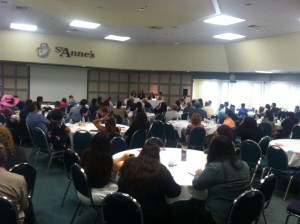
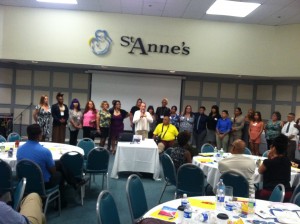
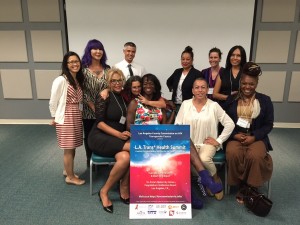
Please click here for a copy of the event program.
Please click here for a copy of the keynote presentation by Dr. Stefan Baral of Johns Hopkins School of Public Health. Click here to view video.
Please click here for a copy of the afternoon presentation by Ayako Miyashita, JD, of the UCLA Williams Institute. Click here to view video.
Slide presentation: Scaled Inverse Probability Weighting for Event Non-Reporting in Ecological Momentary Assessment Studies
Ecological momentary assessment (EMA) is an increasingly popular assessment method in the behavioral sciences that aims to capture events, emotions, and cognitions in real time, usually repeatedly throughout the day. Because EMA typically involves more intensive monitoring than traditional assessment methods, missing data is commonly an issue and this missingness may bias results. EMA can involve two types of missing data: known missingness, arising from non-response to scheduled prompts, and hidden missingness, arising from non-reporting of focal events (e.g. an urge to smoke or a meal). Prior research on missing data in EMA has focused almost exclusively on non-response to scheduled prompts. In this talk, I introduce a scaled inverse probability weighting approach to adjust for event non-reporting, which can bias estimates of event frequency and characteristics or response to events. In the proposed approach, the inverse probability is the estimated probability of compliance with random prompts, from a model that uses participant and contextual factors to predict this compliance, and a scaling factor that adjusts for factors specific to event- reporting (in this case, the fatigue of reporting over time). I demonstrate the utility of the proposed method with the Tracking and Recording Alcohol Communications Study, an EMA study of adolescent exposure to alcohol advertising, and discuss its broader applicability to the measurement of other habitual events, such as addictive behaviors or treatment adherence.
July 9, 2015 – Dr. Cathy Reback of the CHIPTS Combination Prevention Core, presented tan overview of the HIV prevalence rates among trans male and female individuals in Los Angeles County. She discussed the syndemic co-factors that impact HIV acquisition and transmission among these populations. The presentation also addressed health disparities that have served to limit health care utilization specifically among high-risk trans women. Next step recommendations were presented.
Cathy J. Reback, PhD, is a Senior Research Scientist with Friends Research Institute, a Research Sociologist with UCLA Integrated Substance Abuse Programs, a Core Scientist with UCLA CHIPTS, and the Executive Director of Friends Community Center in Hollywood. Dr. Reback has been conducting intervention, ethnographic, and epidemiological research with trans women, and has been providing services for trans women for over 20 years. She is a member of the World Professional Association for Transgender Health and is an internationally known researcher in the field of high-risk trans women.
CHIPTS hosts a monthly HIV Research and Community Colloquia Series in collaboration with the Los Angeles County Commission on HIV to highlight current issues and conversations surrounding HIV. Click here for past lectures and check out the events page for more information on future Colloquia presentations!
Yvonne Bryson MD
Distinguished Professor and Chief
Global Pediatric Infectious Disease
DGSOM at UCLA, Mattel Children’s
